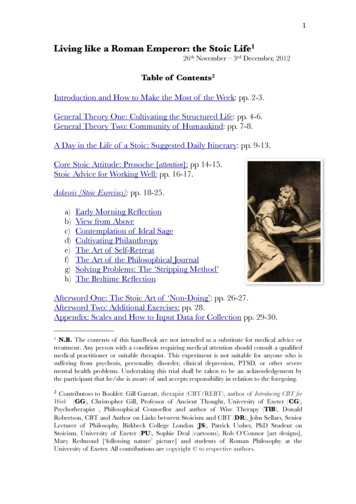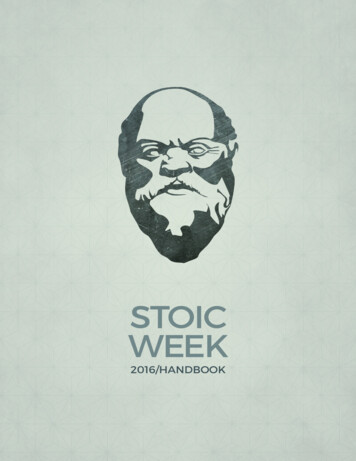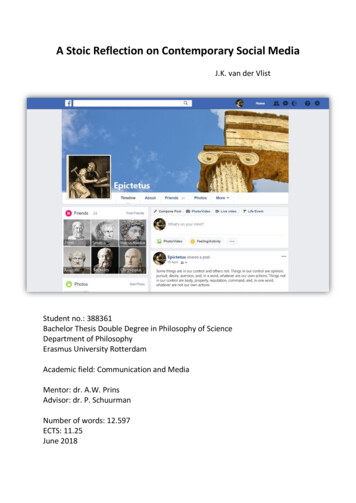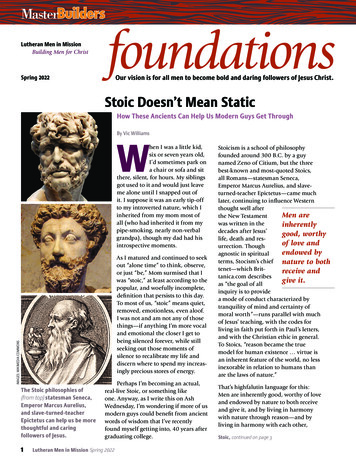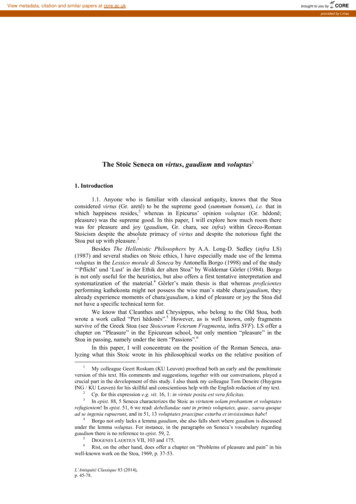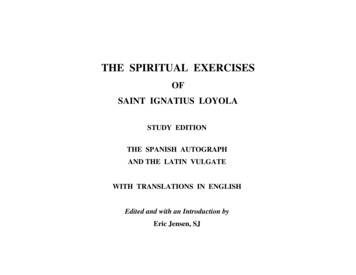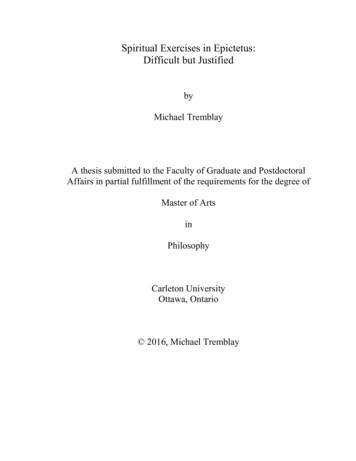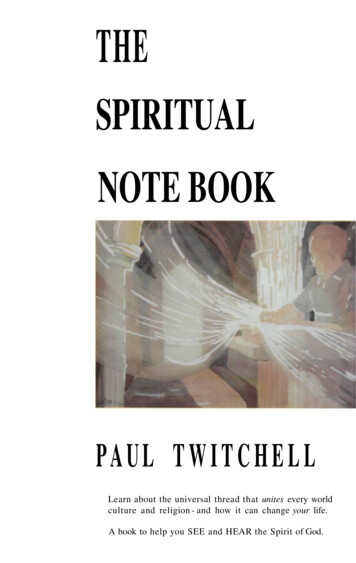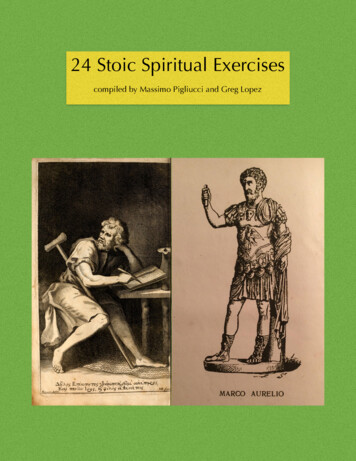
Transcription
24 Stoic Spiritual Exercisescompiled by Massimo Pigliucci and Greg Lopez
Stoic Spiritual Exercisescompiled by Massimo Pigliucci and Greg Lopezfor the howtobeastoic.org blogCover: Epictetus (left) and Marcus Aurelius (right)Cartoons: from actionphilosophers.comBack cover: Roman Forum, photo by Massimo PigliucciPublished by HowToBeAStoic.org, New York, NYCopyright Massimo Pigliucci, 2016Font: Optima regularLicensed under a Creative Commons license
IntroductionStoicism is a practical philosophy of life, and while I enjoy writing about its history andtheory, it is the practice that has so far had a significant impact in my life. I assume it is thesame for most readers too.That’s why in this booklet I collect a number of passages from the ancient Stoics wherethey explicitly advise certain practices or exercises. (Thanks to my friend Greg Lopez forhelping curating the collection, on the occasion of Stoic Camp). The first list is distilledfrom Epictetus’ Enchiridion (the aptly titled “Manual”), while the second list is derivedfrom Marcus’ Meditations (again aptly, a diary that the emperor wrote for his own personaluse).The idea here is to step back for a moment from decidedly more modern “Stoic” exercises,which are actually derived from recent developments in psychology, such as Victor Frankl’slogo-therapy, or cognitive behavioral therapy (see, for instance, Don Robertson’s book).There is, of course, nothing wrong with attempting to update both Stoic theory (as I’vebegan doing here and here) and practice. But it is also, I think, good to keep in mind whatthe ancients actually said and not mix it so thoroughly with modern perspectives that thetwo become indistinguishable.Specifically, as we shall see, ancient Stoic techniques were decidedly leaning on thecognitive/verbal side of things, not so much on the visualization approach promoted bymodern CBT. This isn’t intrinsically bad or good. It just is, and some people will likelyrespond better to cognitive approaches (myself included, it seems), while others will dowell with visualization exercises. Nothing crucial hinges on this, except, again, the needto have present in one’s mind what counts as an ancient Stoic vs a modern Stoic exercise,for the sake of historical clarity, if nothing else.The way I decided to organize the entries below is simply in order of appearance in theEnchiridion or the Meditations, though the same “exercise” may be referred to more thanonce by either author, which I will point out when appropriate. For each entry I give abrief description or comment, followed by the original passage.I hope this modest effort will be both enjoyable and especially useful.Massimo PigliucciK.D. Irani Professor of Philosophythe City College of New YorkNew York City, February 2016
Epictetus, from the EnchiridionExamine your impressions. Here Epictetusexhorts us to practice what is arguably themost fundamental of his doctrines:constantly examine our “impressions,” thatis our initial reactions to events, people, andwhat we are being told, step back to makeroom for rational deliberation, avoid rashemotional reactions, and askwhether whatever is being thrown at us isunder our control (in which case we shouldact on it), or it isn’t (in which case weshould regard it as not of our concern).So make a practice at once of saying toevery strong impression: ‘An impression is all you are, not the source of the impression.’Then test and assess it with your criteria, but one primarily: ask, ‘Is this something that is,or is not, in my control?’ And if it’s not one of the things that you control, be ready withthe reaction, ‘Then it’s none of my concern.’ (Enchiridion I.5)Remind yourself of the impermanence of things. Yes, yes, this is one of the (superficially)harshest passages in Epictetus. Not the part about the china, but the one about the wife orchild. But I think Anthony Long (among others) is right about how this (in)famous quoteought to be interpreted. First off, remind yourself of the historical context: Epictetus waswriting at a time when even emperors (like Marcus himself) lost most of their children andother loved ones at what we would consider a tender or premature age, to disease, or war.While most of us in the West are currently lucky in that respect, the point remains: life isephemeral, and people we deeply care abut may be snatched from us suddenly andwithout warning. Moreover, what Epictetus is counseling here is not an inhumanindifference toward our beloved ones, but quite the opposite: to constantly remindourselves of just how precious they are precisely because they may soon be gone. Anyonewho has lost a person close to them ought to know exactly what this means. We should gothrough life just like the Roman generals went through their official celebratory triumphsin the eternal city: with somebody (in their case, a slave) who constantly whispers in ourears “memento homo” (remember, you are (only) a man).In the case of particular things that delight you, or benefit you, or to which you havegrown attached, remind yourself of what they are. Start with things of little value. If it ischina you like, for instance, say, ‘I am fond of a piece of china.’ When it breaks, then youwon’t be as disconcerted. When giving your wife or child a kiss, repeat to yourself, ‘I amkissing a mortal.’ Then you won’t be so distraught if they are taken from you. (EnchiridionIII)
Reserve clause. Since the only thing truly under our control are our intentions andbehaviors, the outcome of anything we try to do depends at the least in part on externalcircumstances. Which means we should approach doing anything with the Stoicreserve clause, fate permitting.Whenever planning an action, mentally rehearse what the plan entails. If you are headingout to bathe, picture to yourself the typical scene at the bathhouse – people splashing,pushing, yelling and pinching your clothes. You will complete the act with morecomposure if you say at the outset, ‘I want a bath, but at the same time I want to keep mywill aligned with nature.’ Do it with every act. That way if something occurs to spoil yourbath, you will have ready the thought, ‘Well, this was not my only intention, I also meantto keep my will in line with nature – which is impossible if I go all to pieces wheneveranything bad happens.’ (Enchiridion IV)How can I use virtue here and now? The passage below is one of the most empowering ofStoic writings. Epictetus, the former slave, lame because of a once broken leg, tells us touse every occasion, every challenge, as a way to exercise our virtue, to become a betterhuman being by constant practice.For every challenge, remember the resources you have within you to cope with it.Provoked by the sight of a handsome man or a beautiful woman, you will discover withinyou the contrary power of self-restraint. Faced with pain, you will discover the power ofendurance. If you are insulted, you will discover patience. In time, you will grow to beconfident that there is not a single impression that you will not have the moral means totolerate. (Enchiridion X)Pause and take a deep breadth. Here is the crucial step that allows us to more rationallyexamine our impressions: we need to resist the impulse to react immediately, instinctively,to situations. Instead, pause, take a deep breadth, and then consider the issue asdispassionately (in the sense of equanimity, not lack of care) as possible.Remember, it is not enough to be hit or insulted to be harmed, you must believe that youare being harmed. If someone succeeds in provoking you, realize that your mind iscomplicit in the provocation. Which is why it is essential that we not respond impulsivelyto impressions; take a moment before reacting, and you will find it is easier to maintaincontrol. (Enchiridion XX)Other-ize. This is a fascinating one, as we are reminded of just how differently we regardthe same event if it concerns us or other people. Naturally, it is far easier to maintainequanimity (which, again, is not to be confused with emotional impassivity!) when littleinconveniences, or even disasters, happen to others than to ourselves. But why, really?We can familiarize ourselves with the will of nature by calling to mind our commonexperiences. When a friend breaks a glass, we are quick to say, ‘Oh, bad luck.’ It’s onlyreasonable, then, that when a glass of your own breaks, you accept it in the same patientspirit. Moving on to graver things: when somebody’s wife or child dies, to a man we all
routinely say, ‘Well, that’s part of life.’ But if one of our own family is involved, then rightaway it’s ‘Poor, poor me!’ We would do better to remember how we react when a similarloss afflicts others. (Enchiridion XXVI)Speak little and well. I must admit that this is a hard one for me to practice, probably dueto my ego and the professional habits of a teacher who is far too often in professorialmode. Still, I’ve tried to remember this counsel and take it to heart, and it is serving meincreasingly well.Let silence be your goal for the most part; say only what is necessary, and be brief about it.On the rare occasions when you’re called upon to speak, then speak, but never aboutbanalities like gladiators, horses, sports, food and drink – common-place stuff. Above alldon’t gossip about people, praising, blaming or comparing them. (Enchiridion XXXIII.2)Choose your company well. I laugh every time I read this. To modern ears it soundsinsufferably elitist, but it really isn’t (remember, it comes from an ex-slave who was makinga living teaching in the open air). Also, keep in mind that “philosophers” here doesn’tmean professionals, but rather people who are interested in following virtue. Moregenerally, this is simply the sound advice that our life is short, and temptation and wasteare always lurking, so we need to pay attention to whom we spend our time with anddoing what.Avoid fraternizing with non-philosophers. If you must, though, be careful not to sink totheir level; because, you know, if a companion is dirty, his friends cannot help but get alittle dirty too, no matter how clean they started out. (Enchiridion XXXIII.6)Respond to insults with humor. This is a lovely example of profound wisdomaccompanied by Epictetus’ distinctive brand of humor: instead of getting offended bysomeone’s insults (remember, they are not “up to you”) respond with self deprecation. Youwill feel better, and your vilifier will be embarrassed.If you learn that someone is speaking ill of you, don’t try to defend yourself against therumours; respond instead with, ‘Yes, and he doesn’t know the half of it, because he couldhave said more.’ (Enchiridion XXXIII.9)Don’t speak too much about yourself. I must admit to failing at this often enough (see“ego” and “professorial mode” above), but I’m trying. And boy, does that make for a muchbetter social experience!In your conversation, don’t dwell at excessive length on your own deeds or adventures.Just because you enjoy recounting your exploits doesn’t mean that others derive the samepleasure from hearing about them. (Enchiridion XXXIII.14)Speak without judging. Still working on this one too, but, again, this is so true, and sotypically Stoic. The idea is to distinguish between matters of fact — to which we canassent, if we find them justified by observation — and judgments — from which we
generally speaking ought to abstain, since we usually don’t have sufficient information.Just imagine how much better the world would be if we all refrained from hasty judgmentsand looked at human affairs more matter of factly.Someone bathes in haste; don’t say he bathes badly, but in haste. Someone drinks a lot ofwine; don’t say he drinks badly, but a lot. Until you know their reasons, how do you knowthat their actions are vicious? This will save you from perceiving one thing clearly, but thenassenting to something different. (Enchiridion XLV)
Marcus Aurelius, from the MeditationsMorning meditation on others. This is afamous passage, displaying Marcus’somewhat pessimistic view of humanityright up front. Nonetheless, the message ispowerful, and can be adopted also bypeople with a more cheerful disposition(or at the least a sense of humor about thereality of things).Begin the morning by saying to yourself, Ishall meet with the busybody, theungrateful, arrogant, deceitful, envious,unsocial. All these things happen to themby reason of their ignorance of what isgood and evil. But I, who have seen thenature of the good that it is beautiful, andof the bad that it is ugly, and the nature ofhim who does wrong, that it is akin to me,not only of the same blood or seed, but that it participates in the same intelligence and thesame portion of the divinity, I can neither be injured by any of them, for no one can fix onme what is ugly, nor can I be angry with my kinsman, nor hate him. For we are made forcooperation, like feet, like hands, like eyelids, like the rows of the upper and lower teeth.To act against one another then is contrary to nature; and it is acting against one anotherto be vexed and to turn. (Meditations II.1, see also X.13)Keep at-hand principles. Here is advice to do precisely what I am attempting to do withthis collection: create an easily accessible tool that reminds me, whenever needed, ofwhat is really important and how to think about it. (Below, keep in mind that “divine” canjust as well be interpreted as “natural” in Stoic parlance.)As physicians have always their instruments and knives ready for cases that suddenlyrequire their skill, so do you have principles ready for the understanding of things divineand human, and for doing everything, even the smallest, with a recollection of the bondthat unites the divine and human to each other. (Meditations III.13, see also end of IV.3, V.16 and VII.2)Why am I doing this? We are purposeful animals, and yet much of what we do seems tobe not particularly well thought out. The Stoic advice is to consider carefully what we aredoing and why. Life is short, make the best (i.e., the most virtuous) of it.Let no act be done without a purpose, nor otherwise than according to the perfectprinciples of art. (Meditations IV.2, see also VIII.2)
Renunciation. Marcus here is talking about “indifferents,” that is things that may bepreferred or dispreferred, but are not an intrinsic component of virtue — like wealth,material possessions, reputation, and the like. The suggestion is to train oneself to dowithout them, at the least from time to time, to both remind us that they are not crucial foreudaimonia, as well as to better appreciate them when we do have them.The more of these things a man deprives himself of, or of other things like them, or evenwhen he is deprived of any of them, the more patiently he endures the loss, just in thesame degree he is a better man. (Meditations V.15)Decomposition exercise. The one below is another famous excerpt from Marcus, wherehe prods himself to look at the basic constituents of things and actions, appreciating anewthat they are material things to which all too often we attribute more importance than theydo in fact have. To put things in context, the bit about sexual intercourse probably shouldnot be interpreted as prudish (Marcus did, after all, have 13 children!), but rather as acheck against lust for lust’s sake.When we have meat before us and such eatables, we receive the impression that this is thedead body of a fish, and this is the dead body of a bird or of a pig; and again, that thisFalernian is only a little grape juice, and this purple robe some sheep’s wool dyed with theblood of a shellfish; or, in the matter of sexual intercourse, that it is merely an internalattrition and the spasmodic expulsion of semen: such then are these impressions, and theyreach the things themselves and penetrate them, and so we see the things as they truly are.Just in the same way ought we to act all through life, and where there are things thatappear most worthy of our approbation, we ought to lay them bare and look at theirworthlessness and strip them of all the words by which they are exalted. For outward showis a wonderful perverter of reason, and when you are most sure that you are employedabout things worth your pains, it is then that it cheats you most. (Meditations VI.13, seealso III.11, VIII.11, XI.2, XI.16 and XII.10)Acknowledging others’ virtues. This is one version of the common Stoic idea of remindingoneself of role models, because virtue cannot be learned just by way of theory, it requiresexamples and practice.When you wish to delight yourself, think of the virtues of those who live with you; forinstance, the activity of one, the modesty of another, the liberality of a third, and someother good quality of a fourth. For nothing delights so much as the examples of the virtueswhen they are exhibited in the morals of those who live with us and present themselves inabundance, as far as is possible. Hence we must keep them before us. (Meditations VI.48,though also see all of book I)Take another’s perspective. A wonderful exercise in humility, reminding us to step inanother person’s shoes to at the least attempt to see things from their perspective, beforepassing judgment.
When a man has done you wrong, immediately consider with what opinion about good orevil he has done wrong. For when you have seen this, you will pity him, and will neitherwonder nor be angry. For either you yourself think the same thing to be good that he doesor another thing of the same kind. It is your duty then to pardon him. But if you do notthink such things to be good or evil, you will more readily be well disposed to him who isin error. (Meditations VII.26, see also IX.34)View from above. A classic Stoic exercise: seeing things from a distance helps us put themin the proper (cosmic) perspective.You can rid yourself of many useless things among those that disturb you, for they lieentirely in your imagination; and you will then gain for yourself ample space bycomprehending the whole universe in your mind, and by contemplating the eternity oftime, and observing the rapid change of every part of everything, how short is the timefrom birth to dissolution, and the illimitable time before birth as well as theequally boundless time after dissolution. (Meditations IX.32, see also VII.48 and XII.24— third exercise)How did they (not) sin? Short, profound, and rather self-explanatory.If any man has done wrong, the harm is his own. But perhaps he has not done wrong.(Meditations IX.38)Keep change and death in mind. Change and death are inevitable, that is why we need tofocus on what we do here and now, hic et nunc.Acquire the contemplative way of seeing how all things change into one another, andconstantly attend to it, and exercise yourself about this part of philosophy. For nothing is somuch adapted to produce magnanimity. Consider in what condition both in body andsoul a man should be when he is overtaken by death; and consider the shortness of life,the boundless abyss of time past and future, the feebleness of all matter. (Meditations X.11and XII.7, see also X.18, X.19 and X.29)When offended A handy reminder of how silly it is to get offended at someone else’sbehavior or words.When you are offended at any man’s fault, immediately turn to yourself and reflect in whatmanner you yourself have erred: for example, in thinking that money is a good thing orpleasure, or a bit of reputation, and the like. (Meditations X.30, see also IX.42)Rebutting thoughts. Stoicism is often acknowledged as the forerunner of some of the mostefficacious modern therapies, such as Victor Frankl’s logotherapy and Albert Ellis’ rationalemotive behavior therapy. This passage could easily have been written by a moderncounselor, inviting you to challenge your own thoughts, to argue with yourself, until yousee things more clearly and begin to act accordingly.
There are four principal aberrations of the superior faculty against which you should beconstantly on your guard, and when you have detected them, you should wipe them outand say on each occasion thus: this thought is not necessary; this tends to destroy socialunion; this which you are going to say comes not from the real thoughts — for you shouldconsider it among the most absurd of things for a man not to speak from his real thoughts.But the fourth is when you shall reproach yourself for anything, for this is an evidence ofthe diviner part within you being overpowered and yielding to the less honorable and tothe perishable part, the body, and to its gross pleasures. (Meditations XI.19)Morning meditation on the cosmos. Lastly, an exercise that is a combination of physicaland spiritual: at the least from time to time, get your butt off the bed before dawn, headout to a spot where you can see the Sun rise, and think about your place in the universe.The Pythagoreans bid us in the morning look to the heavens that we may be reminded ofthose bodies that continually do the same things and in the same manner perform theirwork, and also be reminded of their purity and nudity. For there is no veil over a star.(Meditations XI.27)
Stoicism is a practical philosophy of life, and while I enjoy writing about its history andtheory, it is the practice that has so far had a significant impact in my life. I assume it isthe same for most readers too.That’s why in this booklet I collect a number of passages from the ancient Stoics wherethey explicitly advise certain practices or exercises. (Thanks to my friend Greg Lopez forhelping curating the collection, on the occasion of Stoic Camp). The first list is distilledfrom Epictetus’ Enchiridion (the aptly titled “Manual”), while the second list is derivedfrom Marcus’ Meditations (again aptly, a diary that the emperor wrote for his ownpersonal use).The idea here is to step back for a moment from decidedly more modern “Stoic”exercises, which are actually derived from recent developments in psychology, such asVictor Frankl’s logo-therapy, or cognitive behavioral therapy (see, for instance, DonRobertson’s book).There is, of course, nothing wrong with attempting to update both Stoic theory (as I’vebegan doing here and here) and practice. But it is also, I think, good to keep in mindwhat the ancients actually said and not mix it so thoroughly with modern perspectivesthat the two become indistinguishable. Massimo Pigliucci
The idea here is to step back for a moment from decidedly more modern “Stoic” exercises, which are actually derived from recent developments in psychology, such as Victor Frankl’s logo-therapy, or cognitive beha
